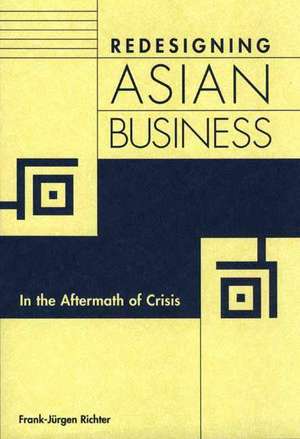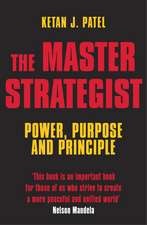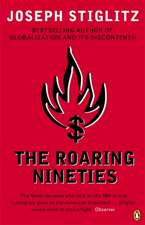Redesigning Asian Business: In the Aftermath of Crisis
Autor Frank-Jürgen Richteren Limba Engleză Hardback – 29 mar 2002 – vârsta până la 17 ani
Preț: 436.73 lei
Preț vechi: 603.61 lei
-28% Nou
Puncte Express: 655
Preț estimativ în valută:
83.58€ • 86.94$ • 68.100£
83.58€ • 86.94$ • 68.100£
Carte tipărită la comandă
Livrare economică 14-28 aprilie
Preluare comenzi: 021 569.72.76
Specificații
ISBN-13: 9781567205251
ISBN-10: 1567205259
Pagini: 208
Dimensiuni: 156 x 235 x 21 mm
Greutate: 0.46 kg
Editura: Bloomsbury Publishing
Colecția Praeger
Locul publicării:New York, United States
ISBN-10: 1567205259
Pagini: 208
Dimensiuni: 156 x 235 x 21 mm
Greutate: 0.46 kg
Editura: Bloomsbury Publishing
Colecția Praeger
Locul publicării:New York, United States
Notă biografică
FRANK-JÜRGEN RICHTER is Director, Asia, at the World Economic Forum, Geneva. Before joining the Forum, he served in various capacities with multinational corporations in Europe and Asia, most recently in Beijing where he developed and managed China operations for a European multinational. Educated in business administration and mechanical engineering in Germany, France, Mexico, and Japan, Richter has written or edited numerous books and is a frequent commentator on matters relating to Asian economics, international management, and global competition. The previous books he edited for Quorum are Business Networks in Asia (1999), The Dragon Millenium (2000), and The Asian Economic Catharsis (2000).
Cuprins
PrefaceWhy Asian Management?The Legacy of ConfucianismThe Three Intrinsic Characteristics of Asian ManagementConfucian ManagementThe History of the Asian Economic CrisisEconomic Development and State-InterventionThe Dark Side of Asian ManagementJapanese KeiretsuKorean ChaebolOverseas Chinese Business GroupsManagement in ChinaHybrid ManagementRecent Developments across the RegionShort-Term Agenda: Fixing the Weakness of Asian ManagementLong-Term Agenda: Editing the Strengths of Asian ManagementWomen and Asian ManagementConclusion: Confucius in the SpotlightSelected BibliographyIndex











